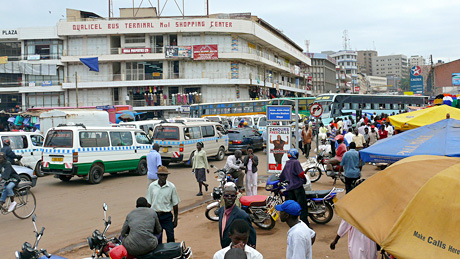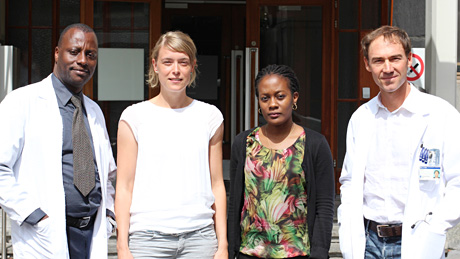Navigation auf uzh.ch
Navigation auf uzh.ch

Kampala 2015. The Ugandan capital gives the impression of being a city on the move. Rush hour traffic is busy to the point of becoming unbearable. Everywhere you look there’s building going on; an expressway will connect the city and the airport, and skyscrapers reach to the equatorial sky.
The contrast with 1981 could scarcely be more stark. Back then the country was riven by civil war following the overthrow of President Idi Amin, and Kampala was a mere shell of a city. 1981 was the year when people first started talking in Uganda about the so-called slim disease, which very quickly led to death. This disease was in fact AIDS, which spread to become a deadly epidemic across the countries of sub-Saharan Africa.
At this time, the medical staff at Mulago Hospital in Kampala noted initial successes with the drug nevirapine, which can prevent mother-to-child transmission of the HIV virus. However, the drug was very expensive and only a minority of those in need could afford it. “Things are completely different now. In urban areas, mother-to-child transmission of the HIV virus can be prevented in the majority of cases with three pills,” says Philippa Musoke, Associate Professor of Pediatrics at Makerere University (MAK) in Kampala.
This treatment method is the result of research carried out as part of international collaboration, and has been recognized as a standard treatment by the Ugandan government. “Producing scientific research results that contribute to better treatment for patients is at the very heart of what the collaboration is about,” says Andrew Kambugu, Head of Research at the Infectious Diseases Institute (IDI) of Makerere University.
The IDI is one of UZH’s partner institutions as part of its North-South Cooperation. Andrew Kambugu is the contact partner of Jan Fehr, attending physician in the Division of Infectious Diseases and Hospital Epidemiology at University Hospital Zurich.
The collaborative medical research work began in 2010 on the basis of a Memorandum of Understanding with Makerere University, and after the setting up of the North-South Cooperation to promote collaborative research and teaching with universities in Africa. There then followed a Memorandum of Understanding between the Faculty of Medicine at UZH, Mulago University Hospital in Kampala, and the College of Health Sciences at MAK.
Physician Alex Coutinho firmly believes that the North-South Cooperation is not just about the transfer of knowledge from the North to the South. “There are now diseases in the North that cannot be beaten without research in Africa,” he says. Coutinho was awarded an honorary doctorate by UZH this year. As Executive Director of the Infectious Diseases Institute, he played a key role in shaping the medical partnership between MAK and UZH. His vision is the creation of a Global Health Institute at UZH.

Tuberculosis is one of the diseases for which there is no good solution, neither in the South nor the North. It is still a major cause of death worldwide, especially in the case of people infected with HIV. The therapy comprises a large number of pills, has many side-effects, and is protracted. This then repeatedly results in treatment failure. Researchers at UZH and the IDI have set themselves the goal of improving this situation, and are carrying out a large-scale study (SOUTH) in Kampala. The first findings have been produced, and these will be used for new therapeutic approaches and strategies.
One of the core elements of the partnership is capacity building, aimed at ensuring that both the structures that are set up and the projects can be maintained sustainably, and even expanded further.
Kampala 2015. Mulago University Hospital is currently being renovated, resulting in a massive amount of additional stress for the patients, but also for the doctors and carers. However, such renovation is not just desirable, it is absolutely necessary, a fact apparent even to a layperson on a short tour around the hospital. Looking at these sick people, the importance of the UZH-MAK partnership is immediately apparent, in that it serves to provide better medical care.